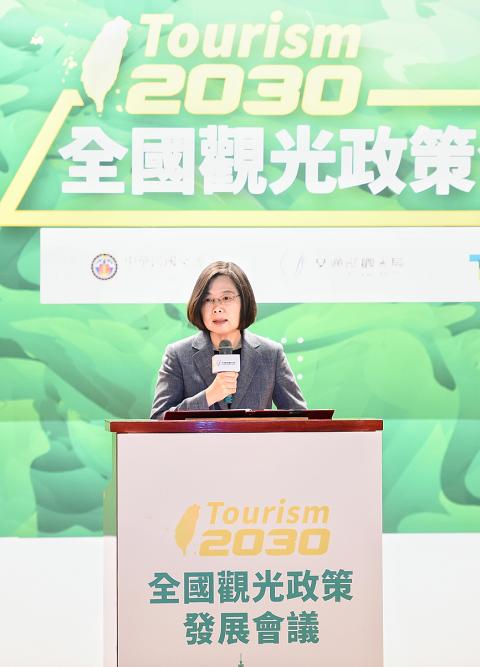Promising to turn Taiwan into one of Asia’s prime travel destinations in the next 10 years, President Tsai Ing-wen (蔡英文) yesterday said that tourism would become a growth driver for the nation’s economy, generating more than NT$1 trillion (US$33 billion) in output.
“We introduced the ‘Big Southern Project’ on Sunday, which is to be enforced to balance development in northern and southern Taiwan. Our goal is that the tourism industry becomes a locomotive that drives the economy forward,” she said at the opening of the “Tourism 2030: National Tourism Policy Development Conference.”
As of last week, Taiwan had received 11.11 million international visitors this year, which would be the fifth year that the number of foreign travelers has exceeded 10 million, Tsai said.

Photo: Chu Pei-hsiung, Taipei Times
The latest Global Muslim Travel Index ranked Taiwan No. 3 among its non-Muslim country travel destinations, she added.
“The most important thing is that all these statistics and rankings are real, not numbers that the government has inflated,” she said.
Tsai added that she was the nation’s first president to organize a campaign to invite Internet celebrities to come and spend one night at the Presidential Office, as a way to introduce Taiwan to the world.
One of them, Palestinian-Israeli Nuseir Yassin, posted videos on his Facebook page titled “Nas Daily,” which is followed by more than 14 million people around the world, Tsai said, adding that the nation would have more exposure in the international community through Internet celebrities like Yassin.
As the government would concentrate on promoting Taiwan’s mountains and other ecological resources to international tourists next year, Tsai said that it would also introduce Aboriginal cultures, which would add value to the nation’s tourism industry.
Asked why the nation has seen a large increase in hotel revenue, although Chinese tourist numbers have dropped by more than 1 million, Tsai said that while the ratio of Chinese visitors has dropped from 44 percent to 24 percent, the nation has still seen an increase in overall tourist numbers.
“We will continue to find new sources of international travelers and hope to elevate the nation’s travel quality and quantity by building on the current foundation,” she said.
Minister of Transportation and Communications Lin Chia-lung (林佳龍) said that a new record was set last week when the number of Japanese travelers exceeded 2 million for the first time.
In October, the number of international travelers who are not from China rose by 16 percent, also a new record.
Statistics from the Tourism Bureau showed that the nation’s foreign-exchange earnings from tourism hit a peak in 2014 at US$14.61 billion.
That was followed by a drop to US$14.38 billion in 2015, US$13.37 billion in 2016 and US$12.31 billion in 2017. However, the figure rebounded last year to US$13.7 billion.
International tourist numbers rose 3.05 percent last year to 11.06 million, with visitors spending 6.46 nights on average.
Their average daily expense rose 6.83 percent to US$191.7 last year, a large part of which was spent on accommodation, which was about 35 percent, it said.

NATIONAL SECURITY THREAT: An official said that Guan Guan’s comments had gone beyond the threshold of free speech, as she advocated for the destruction of the ROC China-born media influencer Guan Guan’s (關關) residency permit has been revoked for repeatedly posting pro-China content that threatens national security, the National Immigration Agency said yesterday. Guan Guan has said many controversial things in her videos posted to Douyin (抖音), including “the red flag will soon be painted all over Taiwan” and “Taiwan is an inseparable part of China,” while expressing hope for expedited “reunification.” The agency received multiple reports alleging that Guan Guan had advocated for armed reunification last year. After investigating, the agency last month issued a notice requiring her to appear and account for her actions. Guan Guan appeared as required,

A strong cold air mass is expected to arrive tonight, bringing a change in weather and a drop in temperature, the Central Weather Administration (CWA) said. The coldest time would be early on Thursday morning, with temperatures in some areas dipping as low as 8°C, it said. Daytime highs yesterday were 22°C to 24°C in northern and eastern Taiwan, and about 25°C to 28°C in the central and southern regions, it said. However, nighttime lows would dip to about 15°C to 16°C in central and northern Taiwan as well as the northeast, and 17°C to 19°C elsewhere, it said. Tropical Storm Nokaen, currently

‘NATO-PLUS’: ‘Our strategic partners in the Indo-Pacific are facing increasing aggression by the Chinese Communist Party,’ US Representative Rob Wittman said The US House of Representatives on Monday released its version of the Consolidated Appropriations Act, which includes US$1.15 billion to support security cooperation with Taiwan. The omnibus act, covering US$1.2 trillion of spending, allocates US$1 billion for the Taiwan Security Cooperation Initiative, as well as US$150 million for the replacement of defense articles and reimbursement of defense services provided to Taiwan. The fund allocations were based on the US National Defense Authorization Act for fiscal 2026 that was passed by the US Congress last month and authorized up to US$1 billion to the US Defense Security Cooperation Agency in support of the

PAPERS, PLEASE: The gang exploited the high value of the passports, selling them at inflated prices to Chinese buyers, who would treat them as ‘invisibility cloaks’ The Yilan District Court has handed four members of a syndicate prison terms ranging from one year and two months to two years and two months for their involvement in a scheme to purchase Taiwanese passports and resell them abroad at a massive markup. A Chinese human smuggling syndicate purchased Taiwanese passports through local criminal networks, exploiting the passports’ visa-free travel privileges to turn a profit of more than 20 times the original price, the court said. Such criminal organizations enable people to impersonate Taiwanese when entering and exiting Taiwan and other countries, undermining social order and the credibility of the nation’s